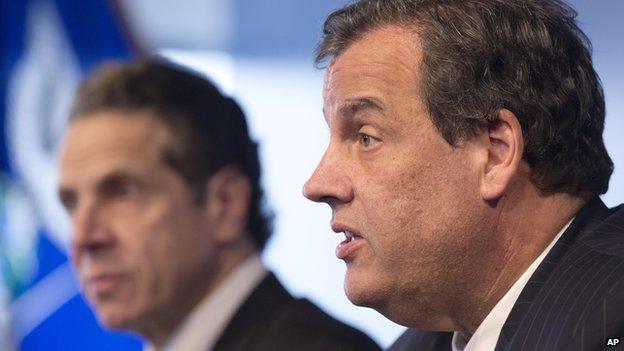US Ebola weakness: Politics is policy
- Published

The Ebola outbreak is putting political pressure on New Jersey Governor Chris Christie (right) and New York Governor Andrew Cuomo
If there's one thing the past few days have made clear, it's that the US doesn't have a unified response to dealing with the public health challenge presented by the Ebola virus. It has 50 responses, influenced by politics and personalities in states across the country.
Blame lies with the nation's founders, perhaps, who devised a federal system that delegates a significant amount of power, including over public health concerns, to lower levels of government.
So when something like the Ebola outbreak comes along - dropped in the middle of the hyper-charged partisanship of an election season, no less - it's not surprising that the state-based reactions are dictated by the quality of their healthcare infrastructure, as well as the agendas, fears and idiosyncrasies of their politicians.
Such was the case when New York Governor Andrew Cuomo and New Jersey Governor Chris Christie unilaterally imposed mandatory 21-day quarantines on healthcare workers returning from Ebola-infected countries on Friday.
"When a doctor, Craig Spencer, tested positive in New York City on Thursday, the two governors watched as city officials strained to trace his every movement - on the subway, at a bowling alley, at a meatball shop," the New York Times reports, external.
"What appeared to be a triumph of meticulous forensic work by city health officials, in retracing Dr Spencer's every step late last week, looked like a potential nightmare to governors who suddenly contemplated having to repeat such an exercise over and over."
Pat Quinn of Illinois and Rick Scott of Florida quickly instituted similar policies in their states - a predictable development, given that both are engaged in tight re-election campaigns.
It also explains how, days later, both Mr Cuomo and Mr Christie backtracked on their decisions when new political realities presented themselves. For Mr Cuomo it was due to the angry reaction of New York City Mayor Bill De Blasio. In New Jersey it was the threatened lawsuit of a telegenic nurse, Kaci Hickox, who had been forced into quarantine after returning from Africa.
Stephen E Flynn, the director of the Center for Resilience Studies at Northeastern University, says, external that the recent state-level responses, including the original, occasionally ham-handed efforts in Texas, "tell us a lot about the nation's uneven preparedness for a deadly disease outbreak".
"The alarms that should be ringing around the country should not be centred on Washington," he writes for Politico Magazine. "Instead, they should be going off in the nation's state capitals and city halls to which falls the task of mobilising a response to infectious diseases and preventing their spread."
New York Governor Andrew Cuomo: "Some people will say we're being too cautious - I'll take that criticism because it's better than the alternative"
As much as anything, he says, it's about money.
"Last year, while New York spent $116.21 [£72] per capita, the median level of state funding across the United States was a paltry $27.49 per person, down by 10% since 2009," he writes. "Missouri, for example, cut its budget by 64% from its 2009 level, spending just $5.86 per Missourian in 2013 - or roughly the cost of a coffee and pastry - for the public health infrastructure their citizens are dependent on when disease strikes."
According to, external Businessweek's Joshua Green, the current situation is also complicated by President Barack Obama's detached leadership style.
Although much of the power over public health resides in states and localities, the president's rhetorical tools are much-needed in a crisis like this.
"Americans' views of deadly viruses such as Ebola are shaped by Hollywood movies such as Outbreak and Contagion, and when the prospect of a global pandemic arises, we expect a Hollywood president to take charge," he writes. "Obama's Spock-like demeanour and hollow assurances about what experts are telling him feel incongruous."
According to public health experts, external, a mandatory quarantine of healthcare workers returning from Ebola-stricken regions of Africa is ineffective at best and counterproductive at worst. But the decisions in New York, New Jersey and elsewhere aren't about proper policy, says, external the Washington Post's Daniel W Drezner, they're about politics.
"Let's be clear - Cuomo and Christie acted in the interest of being perceived as 'doing something' highly visible even though those actions will not make anyone safer," he writes. "It's the definition of security theatre."
Moreover, given US political realities, it's theatre that will play itself out again and again in states across the country as long as new Ebola cases continue to appear.